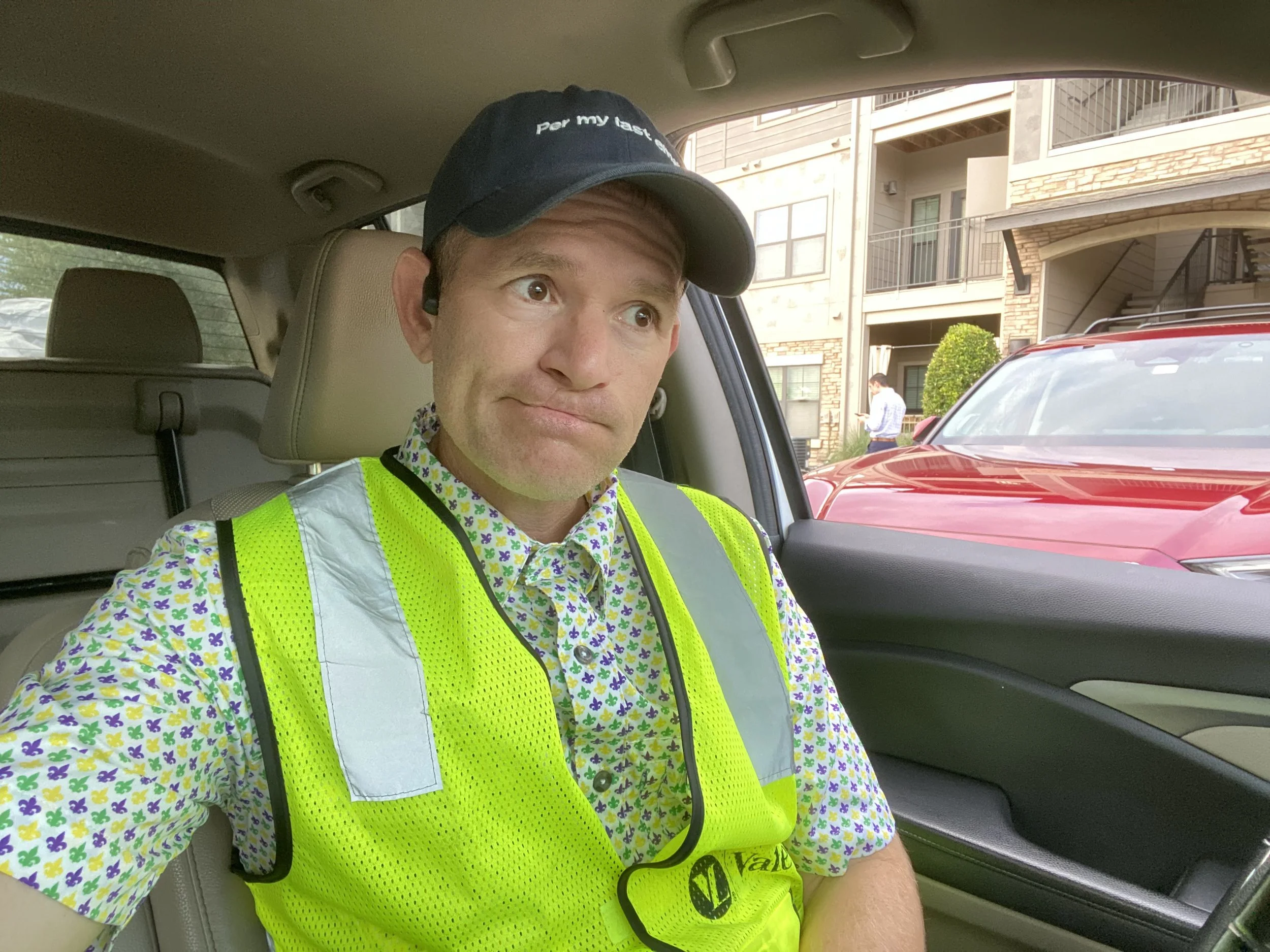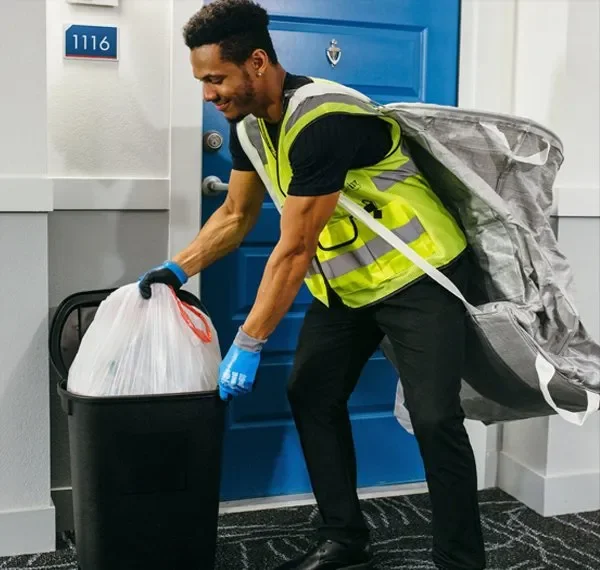Things I Learned While Picking Up Trash for Money
Pondering my life choices before starting a shift as a apartment garbage man.
In the summer of 2025 I picked up trash for money. I was a garbage man. A sanitation worker.
My actual title was Valet. You know, like the ones in front of fancy restaurants, except dirtier.
“Well hello, sir. I’ll escort you to your new home — a nice green iron domicile where you’ll be gently crushed and taken to your forever home at the city dump. Not to worry, I’ll take care of everything. No tip required.”
Why did I do this? Several months into starting my own business, I found myself low on revenue and desperate. I wanted work I could do without a big commitment and this job offered night-time hours. Pick up some trash at an apartment complex? Sounds easy, right?
No. It’s not easy. It’s exhausting. Demoralizing. And just as smelly as you could imagine.
People dump whatever they no longer want. Trash. Food. Unbroken-down cardboard boxes. Used cat litter. Oh, God, the used cat litter.
My rough estimate is that each night, I personally carried about a half-ton of garbage per night. A HALF TON. That’s about 1,000 pounds.
I quickly realized that this job was not meant for me. And thankfully, work picked up for me. But during the process, I learned a few things that clinical leaders can use to become better.
Be Honest About the Job
When I spoke to the HR specialist about the role, I was led to believe that shifts would be about 3 hours. This was mostly true, but they omitted one painful detail — the 6-hour Sunday shifts working alone. The backbreaking stairs you’d be climbing 5.5 hours into a shift while carrying a 50 pound sack of smelly, rotten food. The endless tapping on your phone required by the company during the shift.
I was assigned to one of the “larger properties” according to my new supervisor, Frank. He informed me that he was continually losing his new hires once they were assigned to this property. I could see why. The brutally long Sunday shifts were very difficult.
See, one of the perks of this job was having Fridays and Saturdays off. This means that on Sundays, you have to pick up an entire weekend’s worth of half-eaten chicken wings, used diapers, and casually-tossed-aside Amazon boxes. Hello 6-hour shift with a 1 a.m. end time.
The mythical shoulder-strapped garbage sack.
My Seasoned Advice: Be up front about the job’s less desirable elements. Get the painful truth out before the person is hired. Being honest will improve your staff retention and you’ll waste less money on training and re-hiring the next person.
Provide Quality Tools
When you are lifting heavy bags of garbage over and over again, you begin to notice what slows you down. Very quickly, you ascertain the things that frustrate you.
The gloves you are wearing when you are an apartment trash valet really matter. You see, 10 to 20 times a night, you’ll have to stop what you’re doing, put down your giant trash sack, and whip out your personal mobile device (i.e. your own phone). Then you’ll have to use a dirty, gloved finger to navigate to the company-required app, where you’ll have to input an apartment number, and take before — AND AFTER — photos of the trash pickup.
If your gloves are just a little bit too long for your hand, you’ll have an extra nub of rubber flopping around that makes the data entry 5X more frustrating than it has to be.
Sure, you can also remove your gloves before doing this, but 2 hours into a shift when you’re already thinking about heading home, having to doff and don your gloves (fancy words here—we are valets, after all) feels like a gargantuan waste of time.
The garbage sacks themselves provided another source of irritation.
In the life of a trash valet, there’s nothing more critical to your job (other than the comfort of your shoes, perhaps) than the trash sack. This is the device you carry up and down every flight of stairs that allows you to be more productive. With a trash sack, you can fit 4 to 6 filled garbage bag and carry them all at once.
During my application and orientation process, I was led to believe that I would be provided trash sacks with shoulder straps, like a conventional backpack. With two shoulder straps, it seemed like any load could be manageable. Sadly, I never laid eyes on this mythical backpack-style trash sack. I’m not sure they existed. We were provided only sacks that had hand grips so that the sack could be carried over your shoulder. Bummer. And it was maybe not the best for my wrist and shoulder. I am pushing 50, after all.
(A bit of inside baseball here: I liked to use two garbage sacks, one slung over each shoulder, so that I could evenly distribute the weight rather than have one brutally heavy sack pulling on my shoulder to one side. I’m convinced that this Trash Balancing System (copyright pending) is an innovation that could revolutionize the trash valet business if implemented nationwide.)
The sack height was another matter.
There were two sack heights. A tall one and a short one. A tall one could hold more trash, but often would scrape the ground if you, like me, were “height challenged.”
A short one held less trash, but if you used the two-sack method like me, then you were A-OK because you had two bags at once and two short bags could hold more than one tall one. My supervisor, Frank, insisted that the tall sacks were better because they could hold more, so he gave me a couple of extra tall ones. Useless, Frank. Useless.
Provide great tools for your team. Software, physical instruments, chairs, computers… the things they use every day are critical. A slow laptop can make you hate life itself because every key stroke and mouse movement is tinged with the knowledge that your time is being wasted because your employer is providing you with substandard tools. Each time the chair doesn’t roll right or the software stops working, you increase the odds that your great employees will want to quit.
Each of these things becomes more than just a frustration — they become a reason to see your clinic as penny pinching and uncaring. Don’t be the clinic that overlooks these critical elements of employee experience.
Pay Fairly
In many hourly front-line jobs, you’ll be undervalued. I own a truck that I bought brand new over $40,000 in 2021. While working as a trash valet, the truck stayed running continuously throughout my three to six hour shift. Either that or I would have to start it 30 to 50 times over again during the course of the shift as a moved from one apartment building to the next. I also brought a 5x8 trailer with me to improve my efficiency and reduce my trips back and forth to the dumpster. Can anyone say, “payroll savings?”
Despite bringing these two critical assets to the table, I’ve got paid only an extra three dollars per hour. Effectively, the company was renting the use of my truck and a trailer for about $9 to $18 a night. Quite a bargain.
Make sure that you aren’t underpaying your staff. Reimburse them for use of their personal vehicles if at all possible. Do your research on the prevailing wages in your area and at least match the base pay and benefits standards.
Workers Will Feel Just A Little Bit Abused By Patients - And the Company
In the trash game, you have to take almost everything that the residents leave outside of their apartments. And believe me, they don’t hesitate to pile it on. It wasn’t unusual to see a stack of garbage bags on top of each other.
One unit, in particular, was notorious for leaving bags filled with pots and pans and other crap that should have been brought to Goodwill. Sometimes there was drywall or screws or other building materials bagged up and left for me to haul off. All of it was much heavier than the usual food scraps and paper that most people threw away.
The rule was that I had to take any bag that was 40lbs or under. Have you ever picked up a 40lb dumbbell at the gym? I’m not even sure a garbage bag can hold a 40lb dumbbell. Nevertheless, as required, I took all the heavy garbage bags.
It wasn’t just the apartment residents that made the job harder than it should be.
Company expectations were that I had to take numerous photographs throughout the shift to help prove to the apartment management that I passed a certain unit or to prove that a resident had violated the rules by leaving a trash bag directly on the ground, instead of in the required black trash can. Ten to twenty times per shift I had to pull out my phone, open the company app, navigate the various menus, and snap photographic evidence. Of course, each time I handled my phone I applied a new layer of disgusting filth to it.
What may have seemed like a minor administrative task began to feel like a crushing and annoying burden.
Clinic leaders need to know that while your patients might seem like pleasant little old ladies or happy suburban moms, your front line staff are often experiencing unexpected demands and frequent minor (or major) irritations. Sometimes these irritations come from you. The employees grin and bear it, and you’ll often never hear it. Appreciation goes a long way, and intervention might be required from time to time.
Employees Go the Extra Mile Without You Knowing It
Typical scene at the dumpster after a weekend of suburban debauchery.
Often, when I arrived at the complex dumpster with a full load of trash, I would be greeted with a dumpster chute filled with furniture, boxes, and bulky items. Couches, trash bags, and more were often thrown into the path that led to the dumpster. It was my job to clear this out so I could do my job.
One day, the 4-foot by 4-foot chute leading to the trash crushing machine/dumpster was blocked. The crusher wasn’t working due to an unseen object. Now, this crusher was so powerful that there must have been something truly heinous in the way, but I could not see what.
Since my job depended on getting all of the night’s trash into the dumpster, I could not simply allow this problem to go unsolved. And since getting my manager to drive across the city from where he was to come solve this problem was unlikely to happen quickly, I took matters into my own hands.
I was working with a trainee that night (a rare occurrence) and as I clambered up into the chute, he said “I wouldn’t be doing that.” That didn’t stop him from giving me a boost into the chute, which was nearly five feet off the ground.
I inched my way across the 8-foot-long, horizontal, and very dark iron tunnel that led to the crusher, guided by my co-worker’s meager cell phone flashlight. Carefully, I pulled out a steel clothes drying rack. Someone had thrown in into the chute. WTF, bro?
Once I had safely emerged from the odorous garbage chute, we pressed the button to activate the crushing mechanism and it cycled this time without an issue.
I felt victorious, but had I gone too far down the chute, I would have fallen into the crushing machine and had to climb back out. Please don’t tell OSHA that I did this.
Leaders must know that many of the great things that your staff does to help your clinic go unseen. They go unspoken and unacknowledged. This is a great tragedy and a missed opportunity. Give way more appreciation than criticism and you’ll be headed in the right direction.
Don’t Trash These Leadership Lessons
My short stint as a garbage man was eye opening and my sense of smell took weeks to return to normal. I still can’t pass an apartment complex without wondering how long it would take to pick up its trash. But I walked away with an experience that is hard to replace.
Leaders would be well served to connect with the day-to-day experience of their front-line staff so they can understand how their decisions affect those at the lowest levels of the clinic. Hiring well, providing good tools, and showing lots of appreciation are a good start in overcoming the lack of awareness that comes with leadership.
Now, if you'll excuse me, I need to go disinfect my phone—and possibly rethink my entire life’s choices.
===
Ready to ensure your HR practices in touch with the reality of front-line staff and support your employee engagement? Contact me today.
Free HR Resources for Ophthalmology Clinics
Complete the form and immediately get ALL of my free downloadable resources.
BONUS - Subscribers who sign up for news and updates will get a biweekly newsletter with HR updates, leadership tips, and more.
To get it - sign up now!



